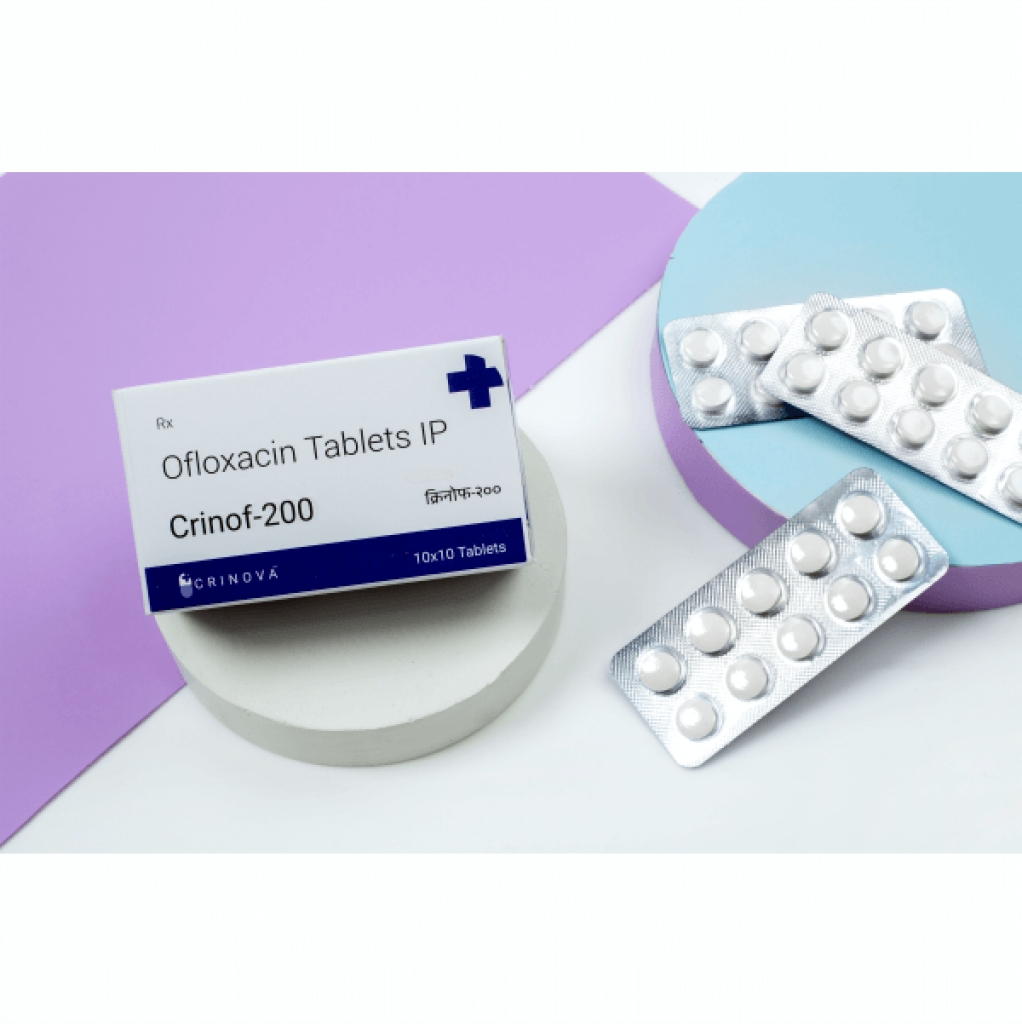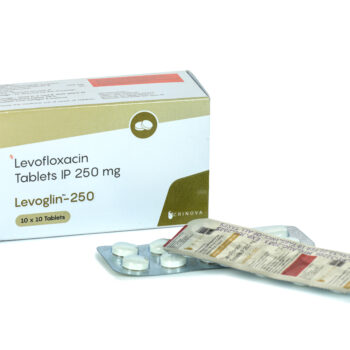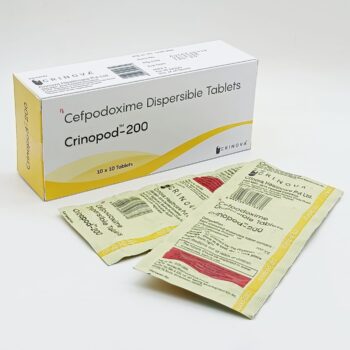INTRODUCTION
Crinof 200 contains Ofloxacin which belongs to a group of medicines called quinolone antibiotics. It is used to treat conditions such as respiratory tract, urinary tract, gynaecological and skin soft tissue infections. Ofloxacin is bactericidal and its mode of action depends on blocking of bacterial DNA replication by binding itself to an enzyme called DNA gyrase.
Ofloxacin is in a class of antibiotics called fluoroquinolones which works against bacteria that cause infections and stops the growth of the bacteria causing the infection and clears the infection.
Before taking Crinof 200 inform your doctor if you have any allergic reactions, liver, kidney or heart problems. Inform your physician if you are pregnant or breastfeeding. It is not suitable for children and adolescents below 18 years of age. The common side effects are nausea, stomach pain, diarrhoea or headache.
USES OF Crinof 200
- Treats respiratory tract, urinary tract, gynaecological and skin soft tissue infections (bacterial infections)
HOW Crinof 200 WORKS
Crinof 200 works against bacteria that cause infections and stops the growth of the bacterial enzyme called DNA-gyrase thus prevents the bacterial cells from dividing and repairing them.
DIRECTIONS FOR USE
Always take Crinof 200 as instructed by your doctor. Swallow as whole and do not crush or chew. Do not exceed the recommended dose.
SIDE EFFECTS OF Crinof 200
SERIOUS
- Blurred, double or altered colour vision
COMMON
- Nausea
- Stomach pain
- Diarrhoea
- Headache
RARE
- Difficulty breathing, swelling of the face, lips and throat
- Skin rashes
- Inflammation of the bowel
- Numbness or tingling in the hands and feet
HOW TO MANAGE SIDE EFFECTS
Diarrhoea:
Drink plenty of fluids and ORS can be used to prevent dehydration.
Nausea:
Drink clear or ice-cold drinks, eat bland foods and avoid fried or sweet foods.
Stomach pain:
Place a warm water bottle on your abdomen. Soak in a warm bath. Drink plenty of clear fluids and water.
Headache:
Rest and drink plenty of fluids. Apply a wet or cold cloth to forehead and rest in a quiet, comfortable, dark room.
WARNING & PRECAUTIONS
PREGNANCY
There are limited studies available on Crinof 200 and it may cause harmful effects on the developing baby. Consult your doctor.
BREASTFEEDING
There are limited human data suggests that the Crinof 200 may pass into the breastmilk and harm the baby. Consult your doctor.
DRIVING AND USING MACHINES
Do not drive or handle any machines if you experience sleepy, dizzy or eyesight problems. Consult your doctor for advice.
ALCOHOL
Consumption of alcohol is not recommended while taking this Crinof 200.
KIDNEY
Crinof 200 should be used with caution in patients with kidney disease, if needed dose will be adjusted accordingly. Consult your doctor for advice.
LIVER
Crinof 200 should be used with caution in patients with liver disease, if needed dose will be adjusted accordingly. Consult your doctor for advice.
ALLERGY
Tell your doctor if you are allergic (hypersensitive) to Ofloxacin.
HEART DISEASE
Crinof 200 should be used with caution in patients with irregular heartbeat, heart failure or any other heart conditions. Consult your doctor for advice.
OTHERS
Inform your doctor before taking this medicine, if you have or had,
- Allergic reactions
- Epilepsy
- History of inflammation and swelling of the tendons (tendonitis)
- Inherited disorder that affects the red blood cells
- Aortic aneurysm
- Mental illness
- Salt imbalance in the blood
- Myasthenia gravis
- Diabetes
INTERACTIONS
Tell your doctor if you are taking,
- Ciprofloxacin, nadifloxacin, norfloxacin (treats infection)
- Quinidine, hydroquinidine, disopyramide, amiodarone, sotalol, dofetilide, ibutilide (treats heart problems)
- Clomipramine, amitriptyline (used to treat depression)
- Erythromycin, clarithromycin, azithromycin
- Medicines or dietary supplements that contain iron (for anaemia) or zinc
- Sucralfate (used for stomach ulcers)
- Antacids, cimetidine
- Corticosteroids, used for treatment of inflammation and swelling
- Ibuprofen or diclofenac and theophylline
- Glibenclamide (treats diabetes)
- Probenecid (used for gout)
- Methotrexate (used for rheumatism)
- Warfarin (treats blood clot)
- Didanosine (used to treat HIV infections)
- Furosemide
SYNOPSIS
| Drug | : | Ofloxacin |
| Pharmacological Category | : | Quinolone antibiotics |
| Therapeutic Indication | : | Bacterial infections |
| Dosage Forms | : | Tablet, Injection, Oral solution, Syrup, Cream, Ointment |
MORE INFORMATION
Store below 20-25°C and keep out of reach of children.
FAQs ABOUT Crinof 200
Can I stop taking Crinof 200 when my symptoms are relieved?
No, do not stop taking and complete the full course of treatment even if you feel better.
Can the use of Crinof 200 cause diarrhea?
Yes. It may cause diarrhea, if you are experiencing severe diarrhea, consult your doctor for advice.
How long does Crinof 200 take to work?
Usually, it starts working soon after taking and it may take some days to act against the harmful bacteria.



